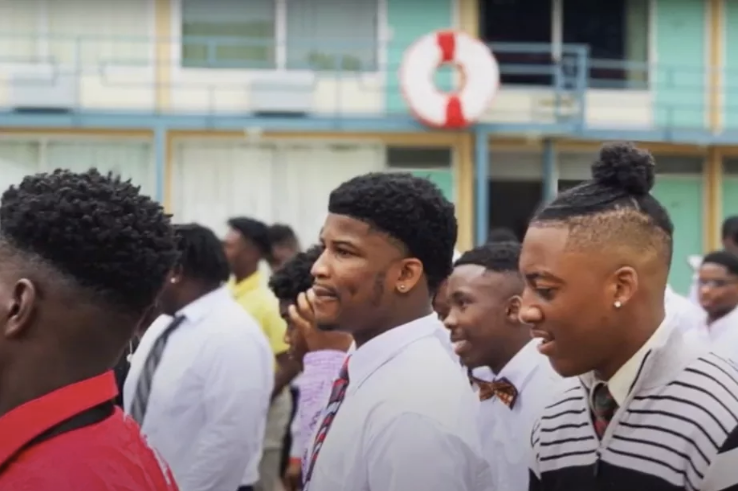Feature Image: In July 2019, black male students gather at the National Civil Rights Museum in Memphis to launch Superintendent Joris Ray’s initiative to increase academic outcomes for black boys. (Shelby County Schools)
Laura Faith Kebede, Chalkbeat Tennessee
Memphis student: ‘George Floyd complied and he was still killed. What can we do at this point?’ was originally published by Chalkbeat, a nonprofit news organization covering public education. Sign up for their newsletters here: ckbe.at/newsletters.
The first time that recent high school graduate Chantz Foster knew to be cautious around police was when he was 9 years old.
A police officer pulled over his dad while Foster was in the car. Before the officer even got out of his car, Foster’s dad started instructing him on how to respond: Make sure the officer can see your hands at all times. Slowly reach for your license and registration and explain your motions to the officer. Make sure you cover all your bases. Foster thought as long as he stuck to the rules and complied with officer instructions, he would be fine.
So, when Foster saw the video of George Floyd handcuffed and saying, “I can’t breathe,” while a Minnesota police officer knelt on his neck for nearly nine minutes, Foster was first appalled — then terrified.
“George Floyd complied and he still was killed. What can we do at this point?” he said.
Floyd’s death has sparked protests across the world and some school districts have reconsidered their relationship with police, since many employ them as school resource officers.
Terrance Bowers, a rising senior at Trezevant High School, said he’s had positive interactions with police officers who join him and his friends to play basketball or throw a football, but he’s not sure that will always be the case.
“The people who are supposed to be protecting us are also the people who are hurting us,” Bowers said. “I don’t know what to expect.”
Bowers and Foster are among a group of students who have been helping Shelby County Schools shape its work to improve academic outcomes for black boys. Superintendent Joris Ray launched the effort, the African-American Male Empowerment initiative, in July.
Here are students’ reflections on Floyd’s death and their own relationships with police in their words:

Chantz Foster, 17
You hear so many names and so many instances where minorities were killed or brutally beaten because of their race, because the officer claimed that they were fearful. But we’re just as fearful when you approach the car. We don’t act impulsively and a lot of times we’re unarmed.
When I think about the possibility of getting pulled over for a speeding ticket, I get nervous and have anxiety. It shouldn’t be that way because a police officer’s job is to protect and serve the people, and they’re doing the opposite.
Not every cop is bad. However, if you have 1,000 good cops and 10 bad cops and the good cops don’t report the bad cops, now you have 1,010 bad cops.We should put the bad cops or those with the wrong intentions on front street [to expose them].
I talk to my friends on group chats about this and we’ll send articles and videos to each other. Everyone was upset with the president’s response. When the Caucasian population was protesting about the country reopening amid a pandemic he was like, these “good people.” However when a black man dies on video and people protest, he calls them thugs. Some people aren’t able to understand and see why people are doing what they’re doing. Like Malcolm X said, people don’t riot for no reason. You give them a reason to riot and protest. I don’t want to loot and riot, but I don’t blame people who do.
When I talk to adults, especially those who lived through the civil rights movement, they’re frustrated and just tired. They’re just ready for a change and hopefully this generation can make that change.
I think the difference between then and now is that this movement is international. You see people in Germany, Japan and the United Kingdom protesting. Because not only is this racial discrimination, it’s also inhumane. No matter what ethnicity, what color, what religion you are, whenever you can just kneel on somebody’s neck for minutes, he’s calling for his mother, he said he can’t breathe — that’s inhumane. I think everybody sees how cruel that is. And I think everyone wants to see that change. I think people in power shouldn’t trivialize this and they should actually make a stand as well.

Terrance Bowers, 17
When I first saw the video, I was shocked along with other emotions. And I feel like it was honestly sad. You hear another man, especially a black man, say he can’t breathe while you still have your knee on his neck. I believe there were other ways the police officer could have resolved that situation than the way he chose. Honestly, I’m scared a little.
While I’ve been at home while all this has happened, I realized school was an outlet for me. I miss school and I still talk with my teammates in a group chat almost every day. But most of the people I talk to about George Floyd were Caucasian people because I wanted to get their perspective on it. And most agreed and said they wished they could change it. They wish they could understand the pain and the fear that we’re feeling.
The list just goes on and on of people who have been killed or hurt by police officers. I feel worse for the families. They’re dealing with this type of pain and it hurts. I couldn’t imagine the pain that I would feel.
Chalkbeat is a nonprofit news site covering educational change in public schools.

